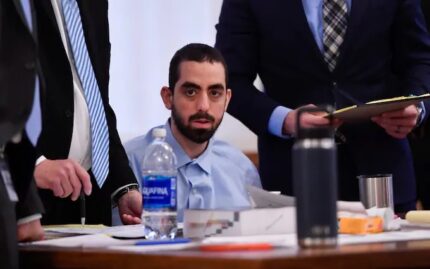Testimony resumed Tuesday in the trial of Hadi Matar, the 27-year-old man accused of attempting to murder renowned author Salman Rushdie in August 2022. Jurors heard firsthand accounts from staffers at the Chautauqua Institution, where Rushdie was scheduled to speak before being attacked on stage.
Prosecutors argue that Matar deliberately carried out the attack, stabbing Salman Rushdie more than a dozen times in a violent and premeditated assault. Video footage from the day of the incident has been presented, alongside graphic testimony from eyewitnesses who recounted the bloodshed and chaos. The jury has also seen images of Rushdie’s injuries, reinforcing the severity of the attack.
Assistant District Attorney Jason Schmidt stated in his opening remarks that “this is not a case of mistaken identity.” He emphasized that Matar was apprehended at the scene and that his actions were witnessed by dozens of people. Schmidt added that the prosecution will focus on the attack itself rather than exploring potential motives linked to the longstanding fatwa against Rushdie.
Defense Attempts to Challenge Prosecution’s Narrative
Matar’s defense team, led by public defender Lynn Schaffer, pushed back against the prosecution’s characterization of the attack as a straightforward case of attempted murder. Schaffer told jurors that while “something very bad happened,” the prosecution must still prove Matar’s intent beyond a reasonable doubt.
The defense has argued that the case is more complex than prosecutors claim. They have sought to challenge whether Matar acted with premeditation and whether the attack meets the legal threshold for attempted murder. Schaffer also suggested that Matar’s state of mind at the time of the attack should be considered, though she did not elaborate on specific defenses such as mental illness or provocation.
Despite these efforts, legal experts suggest that the overwhelming video and eyewitness evidence could make it difficult for Matar’s defense to create reasonable doubt. If convicted, Matar faces a potential sentence of up to 25 years in prison.
Eyewitnesses Describe Horror of the Attack
Several witnesses have taken the stand to describe the terrifying moments when Salman Rushdie was attacked. Deborah Moore Kushmaul, a Chautauqua Institution official, recalled seeing blood spurting from Rushdie’s neck as audience members rushed to subdue Matar. “It was chaos,” she said. “I feared there might be another attack, and we didn’t know if the threat was over.”
Another key witness, Jordan Steves, testified that he saw Matar rush onto the stage with a knife and strike Salman Rushdie repeatedly before security and audience members intervened. “There was no hesitation. He went straight for him,” Steves said.
Jurors were also shown body camera footage from a state trooper who arrested Matar, as well as surveillance videos that captured the moments leading up to the attack. These visuals have been central to the prosecution’s case, reinforcing their argument that Matar acted with clear intent.
Salman Rushdie Expected to Testify
Salman Rushdie, 77, who suffered severe injuries including blindness in one eye and liver damage, is expected to testify later in the trial. His memoir, published last year, details his painful recovery process and the psychological trauma he endured following the attack.
Salman Rushdie’s testimony could provide jurors with a powerful firsthand account of the attack’s impact. Legal analysts believe his statements will further solidify the prosecution’s case, as his description of the attack and its aftermath will serve as compelling evidence of Matar’s intent.
A second victim, Henry Reese, who was scheduled to appear on stage with Rushdie, also sustained injuries during the attack. Reese has expressed his willingness to testify, further bolstering the prosecution’s case.
Potential Federal Terrorism Charges Loom
While this trial focuses on state charges of attempted murder and assault, Matar also faces a separate federal indictment. U.S. authorities allege that he was influenced by a terrorist organization’s 2006 endorsement of the fatwa against Rushdie.
If convicted in this state trial, Matar could still face additional legal consequences at the federal level. A separate trial in U.S. District Court in Buffalo is expected to address these terrorism-related allegations.
As the trial progresses, more evidence and testimonies are expected to shape the jury’s perception of Matar’s intent and culpability. The proceedings are set to continue for up to two weeks, with legal experts predicting a swift verdict given the weight of the evidence presented.














